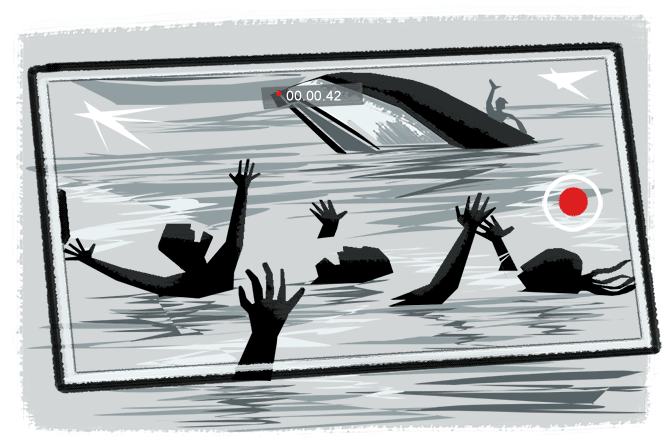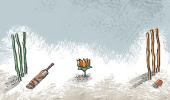'You have to be insensitive and callous to want to shoot the spectacle of persons dying, presumably for the pleasure of posting the picture or video on WhatsApp,' says Shuma Raha.
Illustration: Dominic Xavier/Rediff.com

Every year around the time of Republic Day, the National Bravery Awards go to children who showed exemplary courage under challenging circumstances. The awardees often include a child who saved someone from drowning.
In some cases the acts of heroism ended in tragedy. As it did when Netravati M Chavan, a 14 year old from Karnataka's Bagalkot district, lost her life while trying to rescue two young boys who were drowning. Last year her father received the posthumous award on behalf of this young braveheart.
Last fortnight we saw a very different kind of response to people screaming for help as the waters rushed over their heads. A boat carrying 33 pilgrims capsised in a river in Karwar in Karnataka. Fourteen people drowned.
Those who survived said later that there were at least five other boats in the vicinity. But instead of coming to their aid, the passengers stood by and took pictures of the boat going down.
It is true that not all of us are brave. Not all of us have the courage to think nothing of personal safety and jump in to help others who are in mortal danger. However, you have to be colossally insensitive and callous to want to shoot the spectacle of a person or persons dying, presumably for the pleasure of posting the picture or video on WhatsApp and getting a 'clap' emoji in response.
Karwar is not an aberration, though.
In recent years there has been a number of reports of cases where people stood recording a calamity rather than try to do anything to mitigate it.
In 2017 an 18-year-old boy was hit by a speeding bus in Karnataka's Koppal district. He lay on the ground bleeding and crying for help while bystanders filmed him on their camera phones. The boy died when he was finally taken to hospital.
The lynching videos are not very different. The mob beats a person to death, or mutilates him and sets him on fire; and there are people who stand on the periphery, filming the horror show in the hope of making it go viral on social media.
It makes you wonder if technology is taking a large bite out of our humanity. Social media was supposed to connect us to the world. And it does. It allows us to communicate with thousands whom we do not personally know.
However, paradoxically, it also amplifies and exaggerates our sense of the self by giving us a platform to broadcast ourselves -- our views, our photographs, our videos.
Could it be that the resultant self-centredness -- perhaps best exemplified by the leitmotif of our times, the selfie -- is, in fact, making us so inward-looking that we are now increasingly insensitive to the world without?
So we treat the sight of a man bleeding to death the same way as we do a dish of luscious biryani that we are about to eat -- our very own sensational sensory experience to be captured on a camera phone and shared on social media so it can be hearted and liked?
Experts have written about the way social media's immersive charm can come in the way of people engaging with friends and family in the real world. One doesn't know if those who took pictures of people drowning in Karwar were quite so disconnected from their world.
What is clear, though, is that they were at a chilling remove from the impending deaths of several fellow humans and behaved as though it were a thrill, a sport, a form of entertainment -- more appropriate for recording on their phones than trying to prevent the tragedy from happening.
This loss of perspective, this destruction of empathy for others, is frightening. It is almost the stuff of a dystopia of the future.
Technology improves our lives in myriad ways, but if it chips away at our humanity, the civilisational cost may be terrible.
This year the government made a muddle of the bravery awards and clubbed them under the Pradhan Mantri Rashtriya Bal Puraskar, 2019.
Even so, there they were children who had shown courage, strength, nobility, children whose goodness and humanism were intact and unspoilt.
One would like to believe that they are our future, and that they will own technology rather than let themselves be owned by it.











